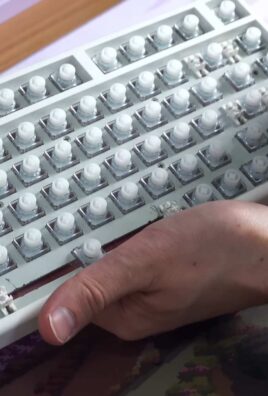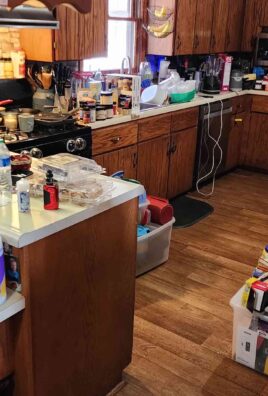Amish cleaning hacks – ever wondered how the Amish keep their homes so spotless and organized, despite living a simpler life? I know I have! For generations, the Amish have relied on resourcefulness and natural ingredients to maintain their homes, passing down time-tested cleaning methods that are both effective and eco-friendly.
These aren’t just random tips; they’re a reflection of a culture deeply rooted in practicality and respect for the environment. Think about it: before the age of harsh chemicals and complicated cleaning gadgets, people relied on what they had readily available. The Amish have preserved this knowledge, offering us a glimpse into a more sustainable and efficient way of keeping our homes clean.
In today’s busy world, who wouldn’t want to simplify their cleaning routine and reduce their reliance on expensive, potentially harmful products? That’s where these Amish cleaning hacks come in! I’m excited to share some of the most ingenious and easy-to-implement tricks I’ve learned, so you can experience the benefits of a cleaner home, a lighter environmental footprint, and maybe even a little bit of that peaceful Amish simplicity in your own life. Get ready to ditch the chemicals and embrace the power of natural cleaning!

Unlocking Amish Cleaning Secrets: A DIY Guide to a Sparkling Home
Hey there, fellow cleaning enthusiasts! I’m always on the lookout for simple, effective, and budget-friendly ways to keep my home spick and span. Recently, I stumbled upon some fascinating Amish cleaning hacks, and let me tell you, they’re game-changers! The Amish are known for their resourcefulness and reliance on natural ingredients, and their cleaning methods reflect that beautifully. I’ve tried and tested these hacks myself, and I’m excited to share them with you so you can experience the magic too. Get ready to ditch those harsh chemicals and embrace a cleaner, greener, and more affordable way to maintain your home!
Understanding the Amish Cleaning Philosophy
Before we dive into the specific hacks, it’s helpful to understand the underlying principles behind Amish cleaning. They prioritize:
* Simplicity: Using minimal ingredients and tools.
* Natural Ingredients: Relying on readily available items like vinegar, baking soda, and lemon juice.
* Effectiveness: Achieving sparkling results without harsh chemicals.
* Sustainability: Minimizing waste and environmental impact.
* Frugality: Saving money by using inexpensive cleaning solutions.
Hack 1: The All-Purpose Vinegar Cleaner
Vinegar is a staple in Amish households, and for good reason! Its acidity makes it a powerful cleaner, disinfectant, and deodorizer. I use this all-purpose cleaner on almost every surface in my home.
What you’ll need:
* Spray bottle
* White vinegar
* Water
* Optional: Essential oils (lemon, lavender, or tea tree are great choices)
Step-by-step instructions:
1. Prepare the solution: In your spray bottle, mix equal parts white vinegar and water. For example, if you’re using a 16-ounce spray bottle, add 8 ounces of vinegar and 8 ounces of water.
2. Add essential oils (optional): If you want to mask the vinegar smell, add 10-20 drops of your favorite essential oil. I personally love lemon for its fresh scent and extra cleaning power.
3. Shake well: Make sure the solution is thoroughly mixed before using.
4. Spray and wipe: Spray the solution onto the surface you want to clean and let it sit for a few seconds. Then, wipe it clean with a microfiber cloth.
5. Rinse (if necessary): For surfaces that come into contact with food, like countertops, I recommend rinsing with water after wiping with the vinegar solution.
Where to use it:
* Countertops (except granite and marble)
* Sinks
* Showers and tubs
* Toilets
* Floors (test in an inconspicuous area first)
* Windows and mirrors
Important note: Avoid using vinegar on granite, marble, or other natural stone surfaces, as it can etch and damage them.
Hack 2: Baking Soda Scrub for Tough Stains
Baking soda is another Amish cleaning superstar. Its mild abrasive properties make it perfect for scrubbing away stubborn stains and grime. I use this scrub in my kitchen and bathroom all the time.
What you’ll need:
* Baking soda
* Water
* Old toothbrush or scrub brush
* Bowl or container
Step-by-step instructions:
1. Make a paste: In your bowl, mix baking soda with just enough water to form a thick paste. The consistency should be similar to toothpaste.
2. Apply the paste: Apply the baking soda paste to the stained or dirty surface.
3. Scrub: Use your old toothbrush or scrub brush to gently scrub the area. Apply a little pressure, but avoid scrubbing too hard, as you could scratch the surface.
4. Let it sit: Allow the paste to sit for 5-10 minutes to allow the baking soda to work its magic.
5. Rinse thoroughly: Rinse the area thoroughly with water to remove all traces of the baking soda paste.
6. Dry: Wipe the surface dry with a clean cloth.
Where to use it:
* Sinks and faucets
* Oven interiors
* Stovetops
* Tile grout
* Bathtubs and showers
* Burnt food on pots and pans
Hack 3: Lemon Juice for Shine and Disinfection
Lemon juice is a natural disinfectant and degreaser that can also add a beautiful shine to surfaces. Plus, it smells amazing! I love using lemon juice to clean my cutting boards and freshen up my kitchen.
What you’ll need:
* Lemon juice (freshly squeezed or bottled)
* Spray bottle or bowl
* Cloth or sponge
Step-by-step instructions:
1. Prepare the solution: You can use lemon juice straight from the bottle or dilute it with a little water if you prefer. For a spray bottle, I usually use a 1:1 ratio of lemon juice and water.
2. Apply the solution: Spray or pour the lemon juice onto the surface you want to clean.
3. Wipe: Use a cloth or sponge to wipe the surface clean.
4. Let it sit (optional): For extra disinfection, let the lemon juice sit on the surface for a few minutes before wiping.
5. Rinse (if necessary): Rinse with water if desired, especially for surfaces that come into contact with food.
6. Dry: Wipe the surface dry with a clean cloth.
Where to use it:
* Cutting boards
* Microwave interiors
* Chrome fixtures
* Glass surfaces
* Garbage disposals (to freshen them up)
Hack 4: Cleaning Windows with Newspaper and Vinegar
This is an oldie but a goodie! Using newspaper to clean windows is an Amish secret for streak-free shine. I was skeptical at first, but it really works!
What you’ll need:
* Vinegar and water solution (see Hack 1)
* Spray bottle
* Newspaper (crumpled)
Step-by-step instructions:
1. Spray the windows: Spray your windows with the vinegar and water solution.
2. Wipe with newspaper: Crumple up a sheet of newspaper and use it to wipe the windows clean. The newspaper acts as a gentle abrasive and absorbs the cleaning solution, leaving a streak-free finish.
3. Repeat if necessary: If the windows are particularly dirty, you may need to repeat the process.
4. Enjoy sparkling windows!
Why it works:
The ink in newspaper acts as a mild abrasive, helping to remove dirt and grime without scratching the glass. The paper also absorbs the cleaning solution effectively, preventing streaks.
Hack 5: Unclogging Drains with Baking Soda and Vinegar
This is a natural and effective way to unclog drains without using harsh chemicals. I use this method whenever my drains start to slow down.
What you’ll need:
* 1 cup baking soda
* 2 cups white vinegar
* Hot water
Step-by-step instructions:
1. Pour in baking soda: Pour 1 cup of baking soda down the drain.
2. Add vinegar: Immediately follow with 2 cups of white vinegar.
3. Let it fizz: The mixture will fizz and bubble. Let it sit for at least 30 minutes, or even better, overnight.
4. Flush with hot water: After the waiting period, flush the drain with a large amount of hot water.
Why it works:
The baking soda and vinegar react to create carbon dioxide gas, which helps to loosen clogs. The hot water then flushes away the debris.
Hack 6: Freshening Carpets with Baking Soda
This is a simple and effective way to deodorize and freshen your carpets without using harsh chemicals. I do this every few months to keep my carpets smelling fresh.
What you’ll need:
* Baking soda
* Optional: Essential oils (lavender, eucalyptus, or tea tree are great choices)
* Vacuum cleaner
Step-by-step instructions:
1. Prepare the baking soda: In a bowl, mix baking soda with a few drops of your favorite essential oil (optional). I usually use about 10-15 drops of essential oil per cup of baking soda.
2. Sprinkle on carpet: Sprinkle the baking soda mixture evenly over your carpet.
3. Let it sit: Allow the baking soda to sit on the carpet for at least 30 minutes, or even longer for heavily soiled carpets.
4. Vacuum: Vacuum the carpet thoroughly to remove all traces of the baking soda.
Why it works:
Baking soda absorbs odors and moisture, leaving your carpets smelling fresh and clean. The essential oils add a pleasant

Conclusion
So, there you have it! These Amish cleaning hacks aren’t just about saving money; they’re about embracing a simpler, more sustainable way of life. They’re about connecting with time-tested wisdom and rediscovering the power of natural ingredients. Forget harsh chemicals and complicated routines. These methods are gentle on your home, your family, and the environment.
The beauty of these hacks lies in their adaptability. Feel free to experiment with different essential oils to customize the scents of your cleaning solutions. Lavender, lemon, and tea tree oil are all excellent choices, known for their antibacterial and antifungal properties. You can also adjust the ratios of ingredients to suit your specific needs and preferences. For instance, if you’re dealing with particularly stubborn stains, you might want to increase the concentration of vinegar in your all-purpose cleaner.
Don’t be afraid to get creative! Consider adding a few drops of your favorite essential oil blend to your homemade laundry detergent for an extra boost of freshness. Or, try using baking soda and water paste to clean your oven – it’s a surprisingly effective and non-toxic alternative to commercial oven cleaners. The possibilities are endless!
These Amish cleaning hacks are more than just recipes; they’re a gateway to a cleaner, healthier, and more mindful home. They offer a refreshing departure from the consumerist culture that often dominates our lives, reminding us that simple solutions are often the best solutions.
We wholeheartedly encourage you to give these DIY cleaning methods a try. You’ll be amazed at how effective and affordable they are. Plus, you’ll be contributing to a more sustainable future by reducing your reliance on harsh chemicals and plastic packaging.
But don’t just take our word for it! We want to hear about your experiences. Did you try the all-purpose cleaner? How did it work on your countertops? Did you use the baking soda paste to clean your oven? What variations did you try? Share your tips, tricks, and successes in the comments below. Let’s create a community of like-minded individuals who are passionate about natural cleaning and sustainable living. Your insights could inspire others to embrace these simple yet powerful Amish cleaning hacks and transform their homes into havens of cleanliness and well-being. Let’s learn from each other and build a cleaner, healthier world, one DIY cleaning solution at a time. We are confident that you will find these methods to be a game-changer in your cleaning routine.
Frequently Asked Questions (FAQ)
What exactly are Amish cleaning hacks?
Amish cleaning hacks refer to traditional cleaning methods and recipes used by the Amish community, often relying on natural, readily available ingredients like vinegar, baking soda, lemon juice, and essential oils. These methods prioritize simplicity, affordability, and sustainability, avoiding harsh chemicals and commercial cleaning products. They are time-tested techniques passed down through generations, emphasizing resourcefulness and a connection to the natural world.
Are these Amish cleaning hacks really effective?
Yes, absolutely! While they may seem simple, the ingredients used in Amish cleaning hacks possess powerful cleaning properties. Vinegar, for example, is a natural disinfectant and degreaser. Baking soda is a mild abrasive and deodorizer. Lemon juice is a natural bleaching agent and adds a fresh scent. When combined correctly, these ingredients can effectively clean a wide range of surfaces and tackle various cleaning tasks. Many people are surprised by how well these natural solutions work, often finding them just as effective, if not more so, than commercial cleaners.
Are these cleaning methods safe for my family and pets?
One of the biggest advantages of Amish cleaning hacks is their safety. Because they rely on natural ingredients, they are generally much safer for your family and pets than commercial cleaners, which often contain harsh chemicals that can be harmful if ingested or inhaled. However, it’s always a good idea to exercise caution and keep cleaning solutions out of reach of children and pets. Also, be mindful of any allergies or sensitivities you or your family members may have to specific ingredients, such as essential oils.
Can I use these cleaning hacks on all surfaces?
While most Amish cleaning hacks are safe for a wide range of surfaces, it’s always a good idea to test them in an inconspicuous area first, especially on delicate or sensitive materials like wood, marble, or granite. Vinegar, for example, can be too acidic for some natural stone surfaces. Baking soda can scratch delicate finishes. Always err on the side of caution and test before applying a cleaning solution to a large area.
Where can I find the ingredients for these cleaning hacks?
The beauty of Amish cleaning hacks is that the ingredients are readily available and affordable. You can find vinegar, baking soda, lemon juice, and essential oils at most grocery stores, pharmacies, and online retailers. In fact, you probably already have many of these ingredients in your pantry! This makes these cleaning methods incredibly convenient and accessible.
How do I store homemade cleaning solutions?
Store your homemade cleaning solutions in clean, airtight containers, such as spray bottles or glass jars. Label each container clearly with the name of the solution and the date it was made. Store them in a cool, dark place away from direct sunlight and heat. Most homemade cleaning solutions will last for several weeks or even months if stored properly. However, it’s always a good idea to discard any solutions that show signs of spoilage, such as discoloration or a foul odor.
Can I customize these cleaning recipes?
Absolutely! One of the best things about Amish cleaning hacks is that they are highly customizable. Feel free to experiment with different essential oils to create your own signature scents. You can also adjust the ratios of ingredients to suit your specific needs and preferences. For example, if you prefer a stronger cleaning solution, you can increase the concentration of vinegar or baking soda. Don’t be afraid to get creative and find what works best for you.
What are some other Amish cleaning hacks I can try?
Besides the all-purpose cleaner and laundry detergent, there are many other Amish cleaning hacks you can explore. For example, you can use baking soda and water paste to clean your oven, vinegar and water to clean your windows, and lemon juice to remove stains from your clothes. The possibilities are endless! Do some research and discover the many other ways you can use natural ingredients to clean your home.
How can I contribute to a more sustainable lifestyle with these hacks?
By using Amish cleaning hacks, you’re reducing your reliance on harsh chemicals and plastic packaging, which contributes to a more sustainable lifestyle. You’re also saving money and reducing your carbon footprint. Every small step counts, and by embracing these simple yet powerful cleaning methods, you’re making a positive impact on the environment.
What if I don’t have time to make my own cleaning solutions?
While making your own cleaning solutions is ideal, you can still incorporate some of the principles of Amish cleaning hacks into your routine even if you’re short on time. Look for natural cleaning products that contain ingredients like vinegar, baking soda, and essential oils. These products are a convenient alternative to homemade solutions and still offer a safer and more sustainable cleaning option.





Leave a Comment